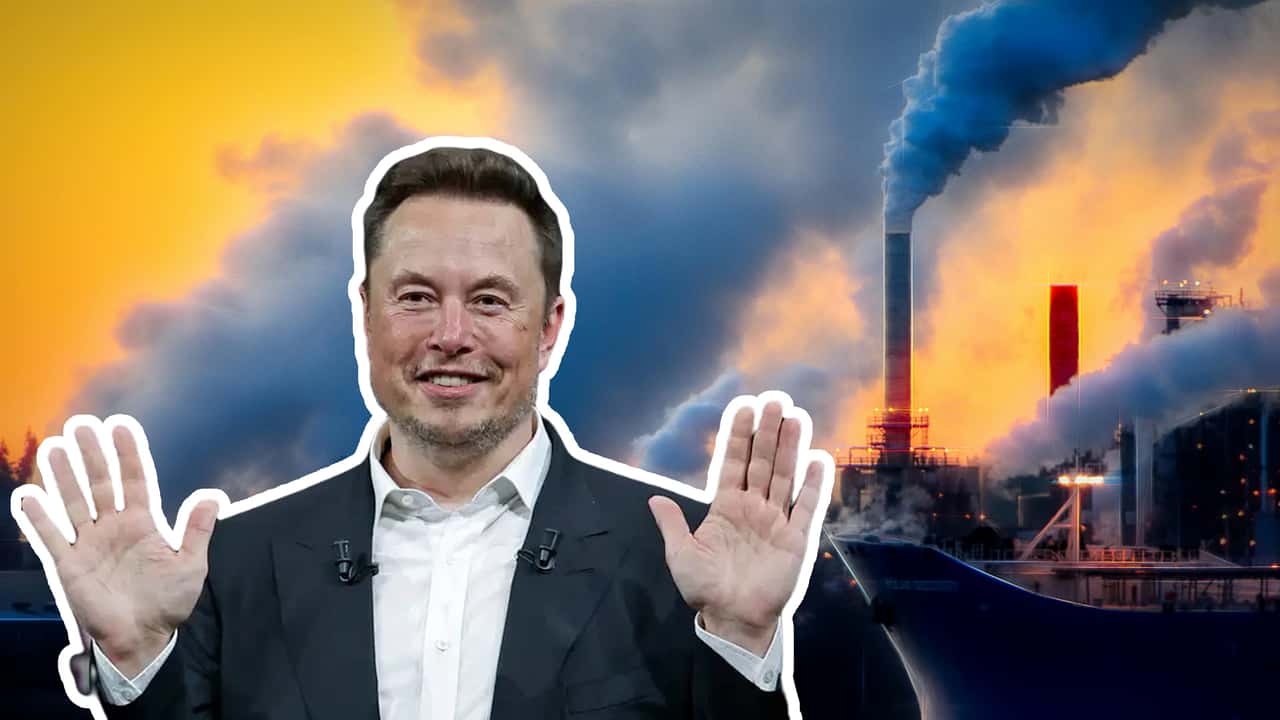- In an interview with former President Donald Trump on X, Tesla CEO Elon Musk seemed to defend the gas and oil industry.
- Despite repeated warnings from the scientific community that rapid change is needed to avoid a climate crisis, Musk said that we can wait “50 or 100 years.”
- Musk contradicted himself during the interview.
In a two-hour-long interview on X with former President Donald Trump, Tesla CEO Elon Musk hinted that we’re being mean to fossil fuels and that there’s still plenty of time for our civilization to transition to a sustainable energy economy, despite the fact that Tesla makes electric cars, solar panels and home and industrial clean energy storage solutions.
“My views on climate change and oil gas […] are pretty moderate,” Musk said. “I don’t think we should vilify the oil and gas industry and the people that have worked very hard in those industries to provide the necessary energy to support the economy,” he added.
Then, Musk touched on the issue of climate change, where he seemed to contradict himself. First, he said that we should indeed strive to transition to a sustainable future, but then he immediately said that the risk of global warming isn’t as high as a lot of people say.
“My view is we do, over time, want to move to a sustainable energy economy because you eventually run out of oil and gas, it’s not infinite. And there is some risk, but the risk is not as high as, you know, a lot of people say it is with respect to global warming,” Musk said.
He added that if the concentration of carbon dioxide in the atmosphere goes beyond a certain level in parts per million (ppm), people will get “headaches and nausea,” but that argument was contradicted just a few seconds later.
“I think if you keep increasing the parts per million in the outskirt long enough, eventually it simply gets uncomfortable to breathe. People don’t realize this, if you go past 1,000 ppm of CO2, you start getting headaches and nausea,” Tesla’s CEO said.
“So we’re now in the sort of 400 ppm range, we’re adding I think about roughly 2 ppm per year. We still have quite a bit of time, so we don’t need to rush and we don’t need to stop farmers from farming or prevent people from having steaks or basic stuff like that.”
At another point during the interview, Musk said that the planet could transition to a sustainable energy economy in “50 to 100 years,” but later Trump changed the imaginary timeline to “100 to 500 years,” which Musk did not correct. This goes against the scientific consensus that says immediate action is needed if we want future generations to still be able to live comfortably on our planet.
In a recent interview, Tesla and SpaceX CEO Elon Musk made a controversial statement, suggesting that we should not vilify the oil and gas industry. This viewpoint has sparked debate among environmentalists, policymakers, and the public at large.
Musk, known for his pioneering work in renewable energy and electric vehicles, acknowledged the importance of the oil and gas industry in powering the world’s economy and infrastructure. He emphasized that these industries have played a crucial role in fueling technological advancements and improving the quality of life for billions of people around the globe.
Furthermore, Musk argued that demonizing the oil and gas sector could hinder progress towards a more sustainable future. He pointed out that many of the challenges facing society, such as climate change and energy insecurity, require a collaborative approach that includes all stakeholders, including traditional energy producers.
While Musk’s comments may seem surprising coming from a vocal advocate for clean energy, they reflect a nuanced understanding of the complex realities of the global energy landscape. The transition to renewable sources of energy will undoubtedly require the cooperation of multiple industries, including oil and gas, to ensure a smooth and sustainable shift.
Critics of Musk’s stance argue that the oil and gas industry has long been a major contributor to greenhouse gas emissions, air and water pollution, and environmental degradation. They contend that prioritizing the interests of fossil fuel companies over the well-being of the planet and its inhabitants is short-sighted and irresponsible.
However, Musk’s message is not necessarily one of absolution for the oil and gas industry. Rather, it is a call for cooperation and innovation to address the urgent challenges of climate change and the need for sustainable energy solutions. Musk himself has invested heavily in developing clean energy technologies and reducing the world’s reliance on fossil fuels.
Ultimately, Musk’s remarks serve as a reminder that progress towards a more sustainable future will require creative thinking, collaboration, and a willingness to engage with all stakeholders, including those in the oil and gas industry. While it may be tempting to vilify traditional energy producers, a more constructive approach may be to work towards a shared goal of a cleaner and more sustainable energy future.

